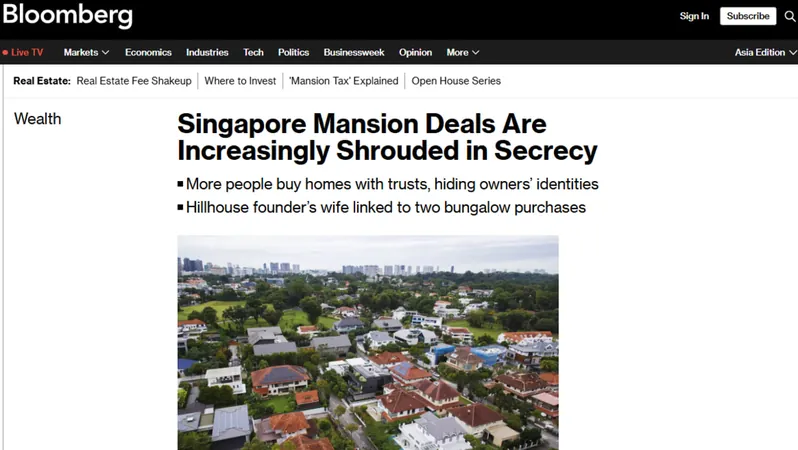
Bloomberg Faces POFMA Order Over Good Class Bungalow Report: Here’s What You Need to Know!
2024-12-23
Author: Daniel
Bloomberg Faces POFMA Order Over Good Class Bungalow Report
In a significant move, government officials have issued a POFMA (Protection from Online Falsehoods and Manipulation Act) order against Bloomberg regarding their recent article on Good Class Bungalows (GCBs) in Singapore. This action underscores the government’s commitment to ensuring transparency in property ownership and transfers.
Access to Property Ownership Details
Access to property ownership details, including GCBs, is readily available on the Integrated Land Information Service (INLIS) portal, managed by the Singapore Land Authority (SLA). This system provides crucial information irrespective of whether a caveat has been registered for a sale transaction.
What Are Caveats and Their Purpose?
Caveats are not meant for tracking property transactions or ensuring transparency, the Factually website explains. Instead, their primary function is to protect the interests of parties involved—such as buyers or mortgagees—who have a legal claim on the property. For instance, a buyer may choose to lodge a caveat to secure their interest during the transaction process until the final transfer is officially recorded with SLA.
Stringent Regulations for Foreign Ownership
The Singapore government has put in place rigorous regulations regarding the identities and citizenship of purchasers of landed residential properties, including GCBs. Notably, since 2021, there have been no approvals granted for foreign purchasers of GCBs, emphasizing the government's strict scrutiny over foreign ownership.
When involved in the acquisition of landed properties, including GCBs, purchasers must declare their identity and citizenship when submitting the transfer documents to the Land Titles Registry. Additionally, legal representatives must certify the accuracy of this information, ensuring compliance with all relevant regulations.
The Fight Against Money Laundering
The government reiterates its dedication to combatting money laundering within property transactions. A comprehensive anti-money laundering (AML) framework is in place to mitigate risks associated with property deals, including those conducted through trusts and companies.
This AML framework is built upon three primary strategies: enhancing the legal and regulatory environment to inhibit criminal activity, improving detection measures for illicit activities, and executing decisive enforcement actions against violators.
Regulated “gatekeepers” in the real estate sector, including lawyers and estate agencies, are mandated to follow AML protocols rigorously. They must verify their clients' identities, including beneficial owners, and in higher-risk scenarios, confirm the sources of wealth. These measures align Singapore's standards with those of leading global financial centers, reinforcing the country’s commitment to maintaining integrity in its property market.
Conclusion: Understanding the Implications
As Singapore continues to tighten its grip on property regulations, it is crucial for potential buyers—be they local or foreign—to remain informed and compliant with legal requirements. This scenario not only highlights the importance of clarity in property transactions but also illustrates the ongoing efforts by the government to uphold the integrity of Singapore’s real estate landscape.
Investors and stakeholders should stay abreast of these developments, as they could have significant implications for future property dealings in the region. Stay tuned for more updates on this developing story!



 Brasil (PT)
Brasil (PT)
 Canada (EN)
Canada (EN)
 Chile (ES)
Chile (ES)
 España (ES)
España (ES)
 France (FR)
France (FR)
 Hong Kong (EN)
Hong Kong (EN)
 Italia (IT)
Italia (IT)
 日本 (JA)
日本 (JA)
 Magyarország (HU)
Magyarország (HU)
 Norge (NO)
Norge (NO)
 Polska (PL)
Polska (PL)
 Schweiz (DE)
Schweiz (DE)
 Singapore (EN)
Singapore (EN)
 Sverige (SV)
Sverige (SV)
 Suomi (FI)
Suomi (FI)
 Türkiye (TR)
Türkiye (TR)